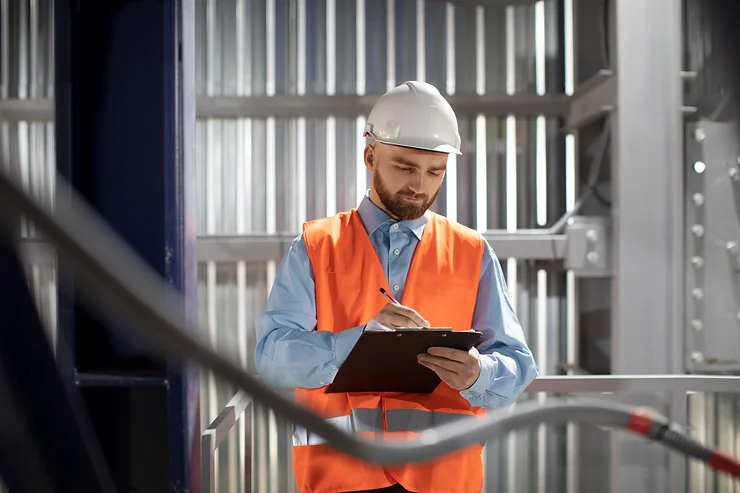Strategies for Reducing Construction Risks on Heavy Industrial Projects
- DyCat Solutions

- Jul 28, 2025
- 3 min read

Modular Construction: A Smarter Approach to Reducing Project Risk
Modular construction is rapidly transforming the way heavy industrial facilities are built. By fabricating and assembling modules in controlled manufacturing environments and installing and integrating them on-site, this method offers measurable advantages in project execution and risk mitigation. For project owners and EPC firms alike, modular construction is a strategic choice for improving outcomes, lowering costs, and increasing safety.
This article explores the top ways modular construction reduces project risk and why it's becoming the preferred method for capital-intensive developments.
Enhancing Safety with Off-Site Construction
Traditional construction sites are inherently hazardous. Falls, equipment accidents, and unpredictable weather all contribute to workplace incidents.
By shifting major construction tasks to a manufacturing environment, safety is drastically improved:
Controlled working conditions: Dedicated fabrication and assembly areas are purpose-built for repetitive industrial tasks and outfitted with appropriate lifting equipment, welding stations, ventilation systems, and material handling tools—enabling better implementation of safety protocols.
Reduced high-risk activities: Tasks like welding and assembly are performed at ground level, significantly lowering the risk of falls and serious injury.
Lower on-site density: With fewer workers and less equipment required on-site, there's a noticeable reduction in pedestrian-equipment interactions and vehicle-related incidents.
Consistent Safety Culture: Manufacturing environments allow for repeatable training, standardized procedures, and continuous safety monitoring—resulting in a more disciplined and safety-conscious workforce.
This systematic reduction of exposure to hazards leads to safer, more efficient project execution—especially critical in heavy industrial environments.
Looking to improve safety on your next project? Contact DyCat Solutions to learn how modular design can help.
Minimizing Weather-Related Delays and Schedule Variability
Weather is one of the most persistent disruptors in traditional site construction. Rain, snow, high winds, and extreme temperatures routinely delay progress, especially in remote or challenging environments.
Modular construction sidesteps this issue by performing the majority of fabrication — and portions of assembly — indoors. This creates several risk-reducing advantages:
Improved productivity: Work continues regardless of external weather conditions.
Shortened timelines: Parallel workflows—where site prep and module fabrication and assembly occur simultaneously—accelerate project delivery.
Reduced material damage and delays: Building in a controlled environment minimizes weather-related impacts on materials and equipment.
These factors contribute to a more predictable schedule and reduced exposure to unplanned delays, ensuring owners and contractors can stay on track.
Want to avoid weather-related construction setbacks? Book a consultation with our modular specialists.
Improving Project Predictability and Control
Project overruns and scope creep are common risks in traditional site constructed builds. Modular construction mitigates these issues through standardized, repeatable processes.
Key benefits include:
Tight quality control: Modules are produced under stringent QA/QC processes, reducing defects and rework.
Simplified site coordination: With reduced on-site labor and equipment, the site construction is easier to manage and coordinate.
Accurate cost forecasting: The predictability of the factory setting allows for more reliable estimates and fewer surprises.
Moreover, by fabricating and assembling modules concurrently with on-site work, overall timelines shrink and resource utilization improves—leading to better capital efficiency and stakeholder confidence.
Need better control over your construction projects? Explore DyCat’s modular design solutions.
Proven Results in Heavy Industrial Sectors
Modular construction has demonstrated significant value across a range of heavy industrial applications, delivering measurable improvements in cost, schedule, and safety performance:
Power, Energy, and Process Facilities: Owners are deploying modular strategies to construct complex facilities—such as refineries, LNG terminals, chemical plants, and renewable energy infrastructure—with greater precision, safety, and schedule control.
Mining: Modularization enables faster deployment of remote facilities, reduces on-site labor exposure, and simplifies logistics in challenging environments.
As more industrial sectors recognize the operational and financial advantages of modular execution, adoption continues to expand—driving a shift in how large-scale capital projects are planned and delivered.
Curious how modularization fits your sector? See our industry-specific insights.
De-Risk Your Next Project with Modular Construction
Modular construction is a smarter way to reduce risk across your entire project lifecycle. From enhancing safety to minimizing delays and increasing control, the benefits are clear. For organizations looking to improve reliability, stay on budget, and meet tight schedules, modularization is an investment in success.
Ready to take the next step? Connect with DyCat Solutions to discuss how modular construction can transform your next project.





